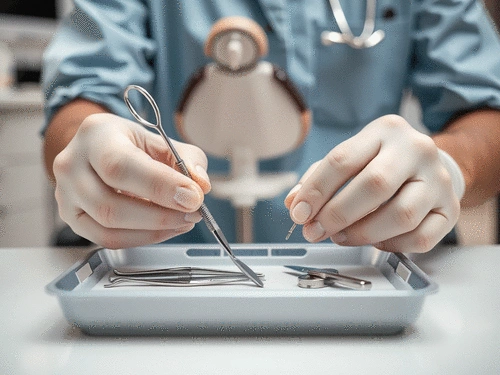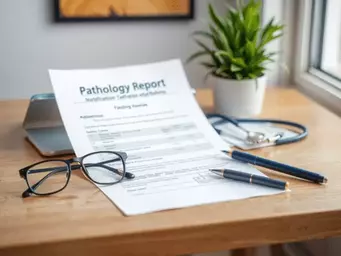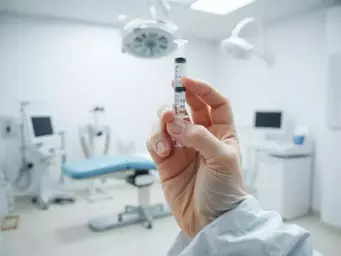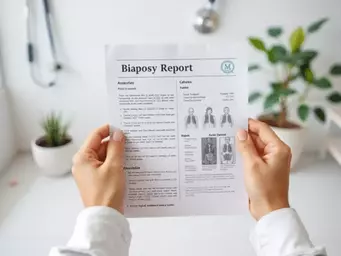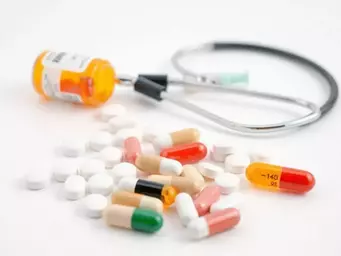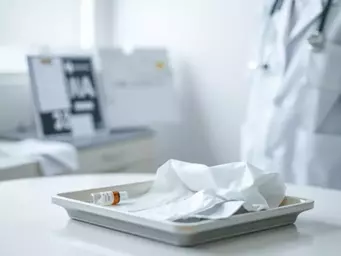Getting ready for an oral biopsy can be overwhelming, but understanding the process can significantly reduce your anxiety and empower you with knowledge. Have you ever wondered what steps you should take to prepare effectively? Let's explore the key insights that will guide you through your oral biopsy experience.
What You Will Learn
- The importance of preparation for an oral biopsy to ensure accuracy and comfort.
- Common reasons for needing an oral biopsy, including suspicious lesions and chronic sores.
- Different types of biopsies available and how to choose the right one for your situation.
- What to expect during recovery and the healing timeline post-biopsy.
- Symptoms that require immediate medical attention after the procedure.
- Key questions to ask your healthcare provider before and after the biopsy.
- Resources for additional information and support during your recovery process.
Oral Biopsy Journey: Preparation, Types, and Healing Timeline
This visual outlines key aspects of the oral biopsy process, from preparation and different biopsy types to the expected healing timeline and important follow-up considerations.
Preparation Essentials
- ✓ Accuracy: Proper preparation leads to more accurate results.
- ✓ Safety: Following guidelines minimizes risks during the procedure.
- ✓ Comfort: Being prepared reduces anxiety and makes the experience smoother.
Biopsy Types
- ● Needle Biopsy: Thin needle extracts tissue.
- ● Surgical Biopsy: More invasive, removes larger samples.
- ● Excisional Biopsy: Removes an entire lesion.
Healing Timeline
- ◈ Days 1-3: Expect swelling & slight bleeding.
- ◈ Days 4-7: Reduced pain & swelling.
- ◈ Week 2: Most patients feel significantly better.
When to Seek Medical Attention
- ⚠ Increased pain unresponsive to OTC relief.
- ⚠ Excessive, non-stopping bleeding.
- ⚠ Fever or chills (potential infection).
Understanding Oral Biopsy Preparation: Key Insights for Patients
When it comes to getting an oral biopsy, many patients feel a mix of curiosity and apprehension. At What Is A Biopsy, we aim to demystify this process and prepare you for what lies ahead. So, what exactly is an oral biopsy, and why is preparation essential? Well, an oral biopsy is a procedure where a small sample of tissue is taken from your mouth to check for abnormalities. The key to a successful biopsy often lies in how well you prepare for it!
Proper preparation not only helps ensure accurate results but also eases some of the anxiety that can accompany medical procedures. Having a clear understanding of what to expect, including the reasons for the biopsy and the types available, empowers you to make informed decisions about your health.
What is an Oral Biopsy and Why Preparation is Essential
An oral biopsy is a critical tool used by healthcare professionals to diagnose potential issues such as infections, lesions, and cancerous growths in the mouth. Preparation is essential for multiple reasons:
- Accuracy: Proper preparation can lead to more accurate results.
- Safety: Following guidelines can help minimize risks during the procedure.
- Comfort: Being prepared can reduce anxiety and make the experience smoother.
At What Is A Biopsy, we want to ensure you feel equipped to handle the process. Understanding the necessity for preparation is the first step in taking control of your health journey!
Common Reasons for Undergoing an Oral Biopsy
Patients may find themselves needing an oral biopsy for several reasons. For instance, the American Association of Oral and Maxillofacial Surgeons provides a position paper on the diagnosis and management of oral lesions, highlighting situations where a biopsy is crucial. Here are a few common ones:
- Suspicious lesions: If a doctor notices something unusual during a routine check-up.
- Chronic sores: Sores that don’t heal can warrant further investigation.
- Persistent pain: Ongoing discomfort that doesn’t have a clear cause may require sampling tissue.
Each reason highlights the importance of the biopsy in diagnosing and treating potential health concerns. Remember, taking this step can provide crucial insights into your health and guide further action!
Understanding Biopsy Types: Choosing the Right Procedure
There are different types of oral biopsies, and it’s important to understand which one is right for you. Here are the main types:
- Needle biopsy: A thin needle is used to extract tissue.
- Surgical biopsy: Involves a more invasive procedure to remove larger tissue samples.
- Excisional biopsy: This method involves removing an entire lesion.
Choosing the right biopsy type is often determined by your healthcare provider based on factors like the location and size of the area being tested. Always feel free to ask your doctor about the best option for your specific situation!
We Want to Hear From You!
What concerns do you have about undergoing an oral biopsy? Share your thoughts below:
Next Steps: Follow-Up and Ongoing Care After Your Oral Biopsy
After undergoing an oral biopsy, it’s important to take the right steps for follow-up and recovery. Understanding what to expect in the coming days can help you feel more at ease. You might be wondering, “How long will it take to heal?” or “What signs should I watch for?” Let's break this down together!
Understanding Healing Timelines and What to Expect
Typically, healing from an oral biopsy can take anywhere from a few days to a couple of weeks, depending on various factors such as the biopsy site and your individual health. During this time, it’s natural to experience some discomfort, but knowing the timeline can help set your expectations.
- Days 1-3: Expect swelling and slight bleeding. This is completely normal!
- Days 4-7: You may notice reduced pain and swelling as healing progresses.
- Week 2: Most patients feel significantly better, but complete healing may take longer.
Keeping a close eye on your healing progress will empower you to recognize any potential issues early on. If something feels off, don’t hesitate to reach out to your healthcare provider. For detailed post-operative instructions, resources like Oklahoma City Oral Surgery's biopsy instructions can be very helpful.
Identifying Symptoms That Require Medical Attention
While most biopsies go smoothly, it's crucial to be aware of symptoms that warrant a call to your doctor. You might think, “What should I be concerned about?” Here are some signs to watch for:
- Increased pain that doesn’t improve with over-the-counter pain relief
- Excessive bleeding that doesn’t stop after applying gentle pressure
- Fever or chills, which could indicate an infection
If you experience any of these symptoms, please reach out to your healthcare provider right away. Remember, you’re not alone in this journey!
Follow-Up Appointment: What to Discuss with Your Oral Surgeon
Your follow-up appointment is an important opportunity to assess your healing and discuss any concerns you may have. Here are some key topics to cover with your oral surgeon:
- Your healing progress and any discomfort you've experienced
- Test results from the biopsy, including what they mean for your health
- Any necessary next steps or additional treatments
Taking the time to have an open and honest discussion will help you feel more informed and confident in your care moving forward.
Engaging with Your Healthcare Provider for Optimal Care
Engagement with your healthcare provider is essential for successful recovery after an oral biopsy. It’s not just about the procedure; it’s about your ongoing care and support. With this in mind, let’s explore how to effectively communicate.
Questions to Ask Before and After Your Oral Biopsy
Having questions prepared can help ease your anxiety and ensure you receive all the information you need. Here are some questions you might consider asking:
- What can I expect during the procedure?
- How should I care for the biopsy site afterward?
- When will I receive my biopsy results?
Don’t hesitate to jot down any personal concerns that may arise. Open communication is key!
Utilizing Resources for Further Information and Support
As you navigate your post-biopsy care, utilizing trusted resources can provide additional support and information. Websites like What Is A Biopsy offer a wealth of articles and guides to empower you on your health journey.
- Visit reliable websites for educational articles and animated guides.
- Join support groups to connect with others who have experienced similar procedures.
- Consider speaking with a counselor if you feel overwhelmed by anxiety.
These resources can help demystify the process and reassure you as you heal.
Communicating Effectively with Your Dentist About Test Results
Once your biopsy results are in, it’s important to have a clear understanding of what they mean for your health. Here’s how to communicate effectively with your dentist:
- Ask them to explain the results in simple terms.
- Discuss any further steps or treatments that may be necessary.
- Express any concerns you have regarding your health and future procedures.
Being proactive in these discussions can lead to better outcomes and peace of mind. Remember, your health journey is a partnership!
Frequently Asked Questions (FAQs) About Oral Biopsies
Concluding Thoughts on Your Oral Biopsy Journey
As you reflect on your oral biopsy experience, it’s important to remember that you are taking significant steps toward understanding your health. I encourage you to embrace this journey with confidence!
Reassurance and Encouragement for Patients
It’s completely normal to feel apprehensive about medical procedures, but you’ve taken a brave step. Remember, knowledge is power, and you are not alone. Reach out whenever you need support or clarification!
Reminder: Importance of Follow-Up Care and Biopsy Results
Finally, always prioritize your follow-up care. Understanding your biopsy results and the next steps in your health journey is crucial. Stay engaged with your healthcare team and continue asking questions. You’re doing great!
Recap of Key Points
Here is a quick recap of the important points discussed in the article:
- Importance of Preparation: Proper preparation for an oral biopsy can lead to more accurate results, enhanced safety, and reduced anxiety.
- Common Reasons for Biopsy: Oral biopsies may be necessary for suspicious lesions, chronic sores, or persistent pain.
- Types of Biopsies: Understand the different types of oral biopsies: needle, surgical, and excisional, to discuss the best option with your healthcare provider.
- Post-Biopsy Care: Healing can take several days to weeks; monitor symptoms and follow up with your dentist about any concerns.
- Effective Communication: Engage with your healthcare provider by asking questions before and after the biopsy to ensure a clear understanding of your health.

